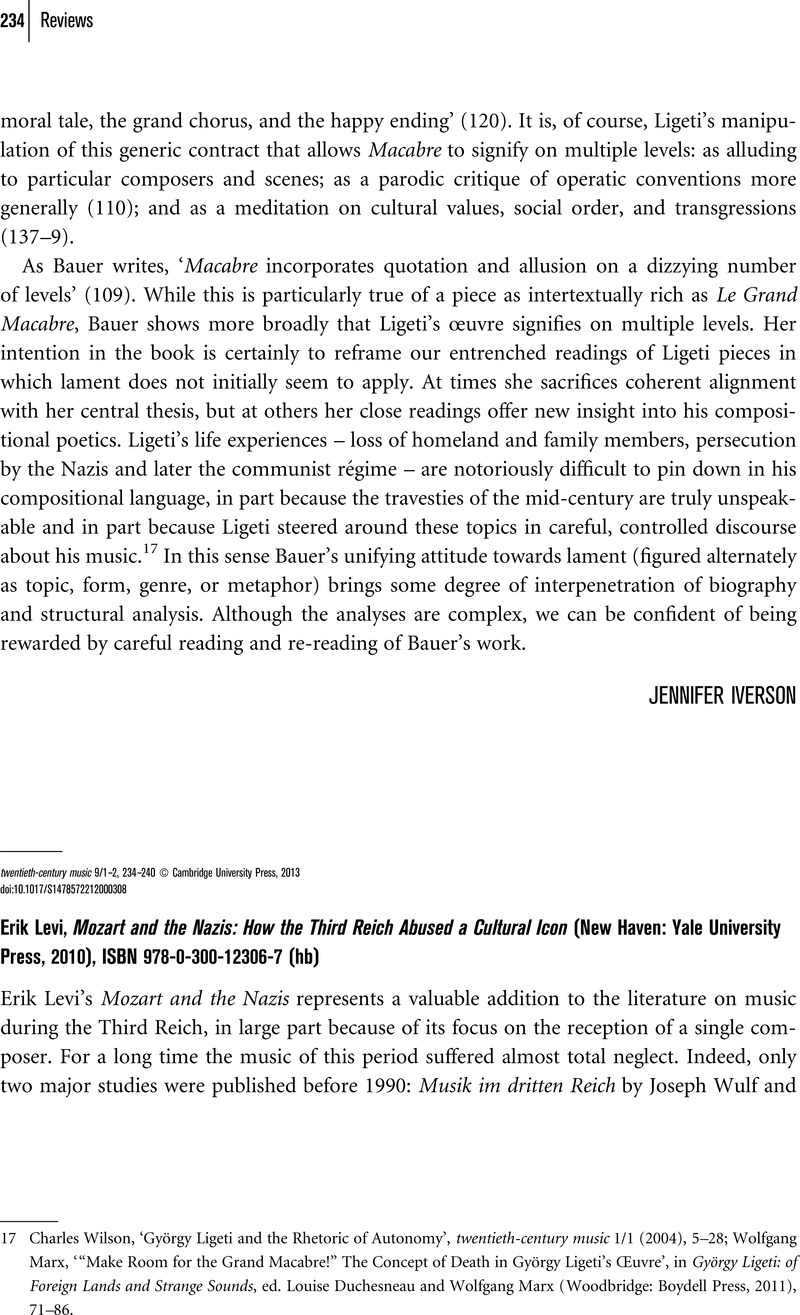No CrossRef data available.
Published online by Cambridge University Press: 27 March 2013

1 Wulf, Joseph, Musik im Dritten Reich: eine Dokumentation (Gütersloh: Mohn, 1963)Google Scholar; Prieberg, Fred K., Musik im NS-Staat (Frankfurt am Main: Fischer Taschenbuch, 1982)Google Scholar.
2 Levi, Erik, Music in the Third Reich (New York: St Martin's Press, 1994)CrossRefGoogle Scholar; Kater, Michael H., The Twisted Muse: Musicians and Their Music in the Third Reich (New York: Oxford University Press, 1997)CrossRefGoogle Scholar; Potter, Pamela, The Most German of the Arts: Musicology and Society from the Weimar Republic to the End of Hitler's Reich (New Haven: Yale University Press, 1998)Google Scholar; and Kater, and Riethmüller, Albrecht (eds), Music and Nazism: Art Under Tyranny, 1933–1945 (Laaber: Laaber, 2003)Google Scholar.
3 Other, more focused studies include work on German exiles and the Jewish musical community, as well as Beethoven's and Wagner's reception in twentieth-century Germany. See Brinkmann, Reinhold and Wolff, Christoph (eds), Driven into Paradise: the Musical Migration from Nazi Germany to the United States (Berkeley: University of California Press, 1999)Google Scholar; Hirsch, Lily, A Jewish Orchestra in Nazi Germany: Musical Politics and the Berlin Jewish Culture League (Ann Arbor: University of Michigan Press, 2010)Google Scholar; and Dennis, David B., Beethoven in German Politics, 1870–1989 (Oxford: Oxford University Press, 1997)Google Scholar.
4 Botstein, Leon, ‘After Fifty Years: Thoughts on Music and the End of World War II’, Musical Quarterly 79/2 (1995), 225–30 (p. 228)CrossRefGoogle Scholar.
5 Chapter 3's discussion of the freemasonry problems leads Levi to a fascinating discussion of the Nazi-era stagings of Die Zauberflöte.
6 Stafford, William, The Mozart Myths: a Critical Reassessment (Stanford, CA: Stanford University Press, 1991)Google Scholar.
7 Max Nyffeler, Kulturchronik 19/4 (2001), 28, quoted in Michael H. Kater, ‘Introduction’ in Music and Nazism: Art under Tyranny, 1933–1945, ed. Kater and Riethmüller, 11. The original German used by Nyffeler was ‘gelegentlichen braunen Resten’.
8 Levi, Music in the Third Reich, xiii.